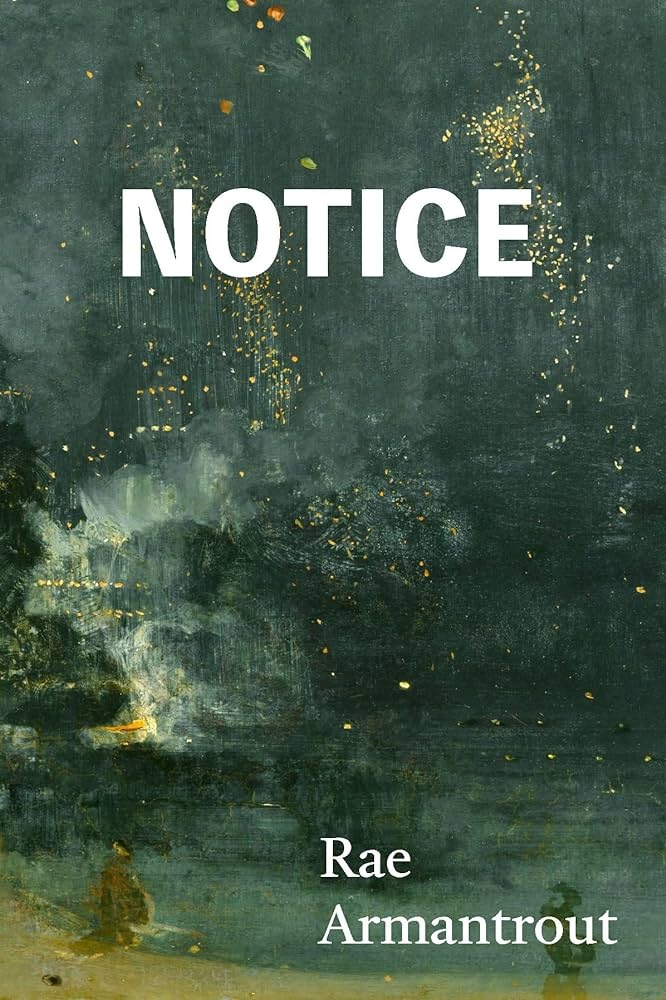
Rae Armantrout
Notice
Wesleyan University Press, 2024
978-0819501011
40 pages
I notice that most writing called ecopoetry turns out to be little other than pastoral description of the kind that has been around for 2000+ years. If we hope to change our current behavior toward our surroundings in an effort to slow climate change, poetry needs multiple new ways to frame humanity’s relationship to nature, multiple because humans have more than one relationship to our habitats.
If poets insist on continuing to write about nature as other than human, then poetry will continue to incorrectly identify and define the channels that connect us. In truth there is no part of humanity that is not natural; we are only somewhat different. Our bodies and minds, our constructions and societies all emanate from the same set of phenomena that creates and sustains cats and oaks. Other animals use tools although people may be the only ones who make tools. That kind of shading.
Here is where I want to start talking about Rae Armantrout’s new chapbook Notice (Wesleyan, 2024). In the same way that all her writing scales poetry so that her stanzas act as metaphors for each other, Notice scales from the person to the stars to engage the human/non-human links. In each poem, the question of human culpability for climate change appears in a different guise. Global warming indicts civilization, but humans, especially those in charge of the polluting supply chains, keep acting as if we do not need to change, or as Armantrout says, “we felt like play actors // before we knew / what we were about // and after.” That is, even though it’s apparent that fossil fuels, concrete manufacture, and agriculture using current methods drive global warming, the major industries and governments are barely planning for wholesale change in how people use their resources.
Turns out
the mummy’s curse
is real.
You pump thick death
out of the ground
and burn it—
it kills you.
Human belief in our righteousness and uniqueness maintains our support for our bodies and our societies. If we denied our value, our species wouldn’t last long. But to question our steps before we take them seems to me only prudent having lived through 2023, the warmest year on record. Our belief in ourselves while necessary needs questioning: “To sleep is to fall / into belief.” What will shake us out of our unquestioning belief in ourselves, our capital formation, and our hierarchies.
What is righteous about exploiting the earth to the extent that we destroy its ability to support us? Looking at the physical realities is as important to our survival as the vaunted minds of poets, “…’Terrific’ / and ‘Terrible’ / are cousins after all.” But information blocks other information, so how shall we as a species prioritize what we believe? Unless we’re heroes, we protect our bodies first, then our families, friends, and nations. Lastly, we are asked to protect the earth that all our cultures tell us is simultaneously the undemanding mother and the scary ogre. Neither permits further assaults, one for sanctity and one for fear of reprisal. How can we reconcile these divergences? “I can’t say anything / more original than: / “Gender Reveal Party / Sparks Massive Wildfire / in tinder-dry forest.”
What are the ways we can reprioritize what we protect? Armantrout despairs: “You never know / what will matter next. // Pack everything.” That’s an ironic solution, we’re already packed in our houses, so where will we go. The joke of Musk’s Martian solution is not one Armantrout shares. She merely frames more subtle despair, “We exposed the homeless / character of desire / to the weather.” But Notice gives more than notice; there’s some hope. “The idea that producing a string of nonsense syllables / while pointing toward an object / may cause that object to change / is common in children on the verge of language.” While that’s mocking hope, we might become “As sly as a mother; as hungry as an orphan.”
I’m not about to criticize Armantrout for failing to come up with a solution to climate change. Poetry’s job is to show us new ways to use language that might change how we think about ourselves and our surroundings. And she does that: “We believe in abstractions. / That’s one way to explain / our failure to prepare.” And what are those abstractions that make us think we don’t need to change to prepare for climate change. “The hope is that / we’re not alone.” I think she means that if we accept our responsibility for ourselves, our biological communities, and our surroundings, we’re more likely to do something to avoid the impending catastrophes even if that means adapting to new conditions.
Those who want company and think we are part of the world can protect the earth. Those who don’t play well with others will continue to feather their own nests at the expense of group values. “Obviously, the stars are bad / role models— // distant, self-absorbed, and / volatile.” If that sounds like some folks we know, then it’s possible that poetry may be the worst method to slow climate change. Nevertheless, Armantrout tries:
But I’m hard to discourage
when a branch lays out five—
like an old card trick—
identical white orchids,
three-petalled light sails spread,
ready to go—each with a small
bat face in the middle
Given Armantrout’s abilities to phrase brilliantly, scale freely, and surprise throughout, Notice does the significant work of transporting readers where they can read as part of their surroundings. My big claim for this small book points to Notice as important step in our Copernican moment of de-centering humanity through poetry.
